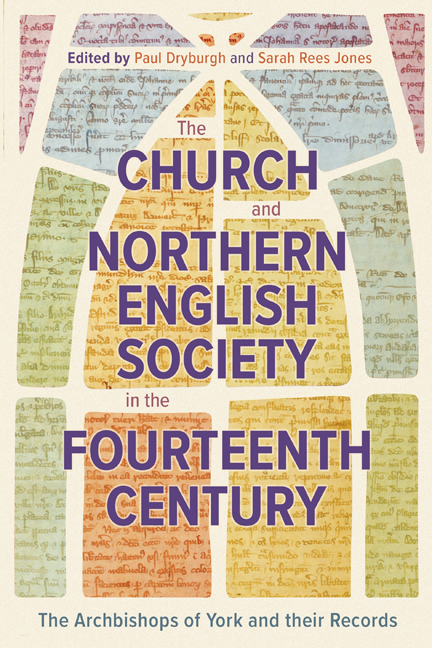 The Church and Northern English Society in the Fourteenth Century
The Church and Northern English Society in the Fourteenth Century Book contents
- Frontmatter
- Dedication
- Contents
- List of Illustrations
- List of Contributors
- Acknowledgements
- List of Abbreviations
- Map: The Ecclesiastical Province of York, c. 1304–1405
- Introduction
- 1 The Administrative Records of the Archbishops of York, 1304–1405
- 2 The Archbishops of York and the Government of Fourteenth-Century England
- 3 Support or Scourge? Archbishop William Melton and the Tradition of Loyal Opposition to the English
- 4 Beyond the Border: The Influence of York Clerks in the Two Edwards’ Scottish Administrations, 1332–1357
- 5 Responding to Royal Requirements: Clerical Taxation in the Province of York, 1304–1405
- 6 Ad insolenciam ipsius rebellis salubrius reprimendam: William Thorntoft, the Abbey of Rufford and Significations of Excommunication in the Northern Province
- 7 Blood, Sex and Holy Water: Reconciling Churches and Churchyards in the Medieval Diocese of York
- 8 Structuring Episcopal Authority: Palaces and Residences of the Archbishop of York
- 9 Medieval Parks of the Archbishops of York
- 10 Northern Ways? Pilgrimage, Politics and Piety in the Fourteenth-Century Administrative Records of the Archdiocese of York
- 11 Underexplored Sources for Gender History: New Approaches to the Fourteenth-Century York Archbishops’ Registers
- 12 Joan of Leeds and other Apostate Nuns in the Province of York, 1300–1350
- Bibliography of Records of the Archbishops of York, 1304–1405
- Index
10 - Northern Ways? Pilgrimage, Politics and Piety in the Fourteenth-Century Administrative Records of the Archdiocese of York
Published online by Cambridge University Press: 17 May 2024
- Frontmatter
- Dedication
- Contents
- List of Illustrations
- List of Contributors
- Acknowledgements
- List of Abbreviations
- Map: The Ecclesiastical Province of York, c. 1304–1405
- Introduction
- 1 The Administrative Records of the Archbishops of York, 1304–1405
- 2 The Archbishops of York and the Government of Fourteenth-Century England
- 3 Support or Scourge? Archbishop William Melton and the Tradition of Loyal Opposition to the English
- 4 Beyond the Border: The Influence of York Clerks in the Two Edwards’ Scottish Administrations, 1332–1357
- 5 Responding to Royal Requirements: Clerical Taxation in the Province of York, 1304–1405
- 6 Ad insolenciam ipsius rebellis salubrius reprimendam: William Thorntoft, the Abbey of Rufford and Significations of Excommunication in the Northern Province
- 7 Blood, Sex and Holy Water: Reconciling Churches and Churchyards in the Medieval Diocese of York
- 8 Structuring Episcopal Authority: Palaces and Residences of the Archbishop of York
- 9 Medieval Parks of the Archbishops of York
- 10 Northern Ways? Pilgrimage, Politics and Piety in the Fourteenth-Century Administrative Records of the Archdiocese of York
- 11 Underexplored Sources for Gender History: New Approaches to the Fourteenth-Century York Archbishops’ Registers
- 12 Joan of Leeds and other Apostate Nuns in the Province of York, 1300–1350
- Bibliography of Records of the Archbishops of York, 1304–1405
- Index
Summary
Episcopal registers can be frustrating hunting grounds for historians of pilgrimage. These registers contain, largely, documents concerned with the administrative machinery of the diocese, with the property rights of the Church and with personal title to ecclesiastical office. Pilgrimage, on the other hand, is usually seen as a personal devotional matter largely in the realm of ‘popular religion’, albeit one that could be trammelled or encouraged by ecclesiastical authorities. Yet diocesan records often provide the only evidence for the existence of a local pilgrimage site, either through attempts to control an unsanctioned or politically unsavoury cult, or through the granting of indulgences to devotional focal points. As this chapter will show, the registers do provide some evidence of official approval or disapproval of pilgrimage sites, whether through indulgences or enjoined penitential pilgrimages, and occasionally of the condemnation of unapproved cults. Yet historians should be wary of interpreting these as evidence for trends in the actual practice of pilgrimage. Rather we should see episcopal interventions as part of a contested landscape of pilgrimage, a point at which ecclesiastical and secular politics interact with personal and communal religious practice.
The landscape of medieval England was filled with places of religious significance, from holy wells and boundary crosses to the massive cathedrals towering above their cities. Throughout the Middle Ages cults sprang up at sites across the country: they flourished and declined, in some cases they were revived or renewed, in other cases they were all but forgotten. This constant process of cult creation around new holy figures, newly discovered relics or newly miracle-working images and statues, characterised and energised the landscape of medieval devotion. Long-established cults, such as those centred on bishops in England's major cathedral churches, may have had the authority of the Church and the weight of history on their side, but they could not take the affections of the laity for granted. We should not mistake the mere existence of a cultic site, however august, and however garlanded by dignitaries of the Church, as evidence for its wider popularity.
When dealing with pilgrimage, it is important to be clear what is meant by that term.
- Type
- Chapter
- Information
- The Church and Northern English Society in the Fourteenth CenturyThe Archbishops of York and their Records, pp. 247 - 267Publisher: Boydell & BrewerPrint publication year: 2024


